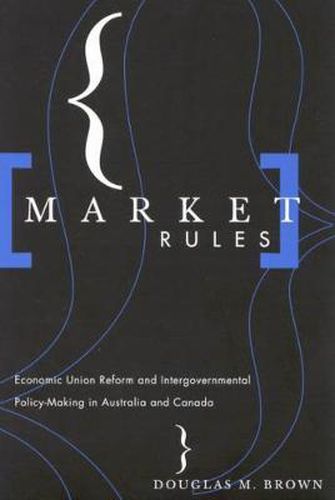Readings Newsletter
Become a Readings Member to make your shopping experience even easier.
Sign in or sign up for free!
You’re not far away from qualifying for FREE standard shipping within Australia
You’ve qualified for FREE standard shipping within Australia
The cart is loading…






Federalism is about dividing and sharing government, often in complex ways that involve some tasks being done jointly. Are federal systems capable of effective joint policy-making? Is this possible in the fast-moving context of globalization? In Market Rules Douglas Brown examines these questions through a comparative study of Australia and Canada, looking at recent major reforms to the economic union in the two federations and comparing them with the evolving European Union (EU). Brown argues that internal barriers to trade and competition in these countries were significant obstacles to competition in the global economy and shows that the old market rules were rooted in longstanding political and regional compromises. He describes the process of detailed and difficult intergovernmental collaboration required for the EU, and now Canada and Australia, to produce new market rules. The resulting reforms created new regimes that provide deeper and broader national economic integration in Canada and Australia than in the EU. The new rules entrench neo-liberal values, retaining some room for diversity and flexibility for equity goals.
$9.00 standard shipping within Australia
FREE standard shipping within Australia for orders over $100.00
Express & International shipping calculated at checkout
Federalism is about dividing and sharing government, often in complex ways that involve some tasks being done jointly. Are federal systems capable of effective joint policy-making? Is this possible in the fast-moving context of globalization? In Market Rules Douglas Brown examines these questions through a comparative study of Australia and Canada, looking at recent major reforms to the economic union in the two federations and comparing them with the evolving European Union (EU). Brown argues that internal barriers to trade and competition in these countries were significant obstacles to competition in the global economy and shows that the old market rules were rooted in longstanding political and regional compromises. He describes the process of detailed and difficult intergovernmental collaboration required for the EU, and now Canada and Australia, to produce new market rules. The resulting reforms created new regimes that provide deeper and broader national economic integration in Canada and Australia than in the EU. The new rules entrench neo-liberal values, retaining some room for diversity and flexibility for equity goals.